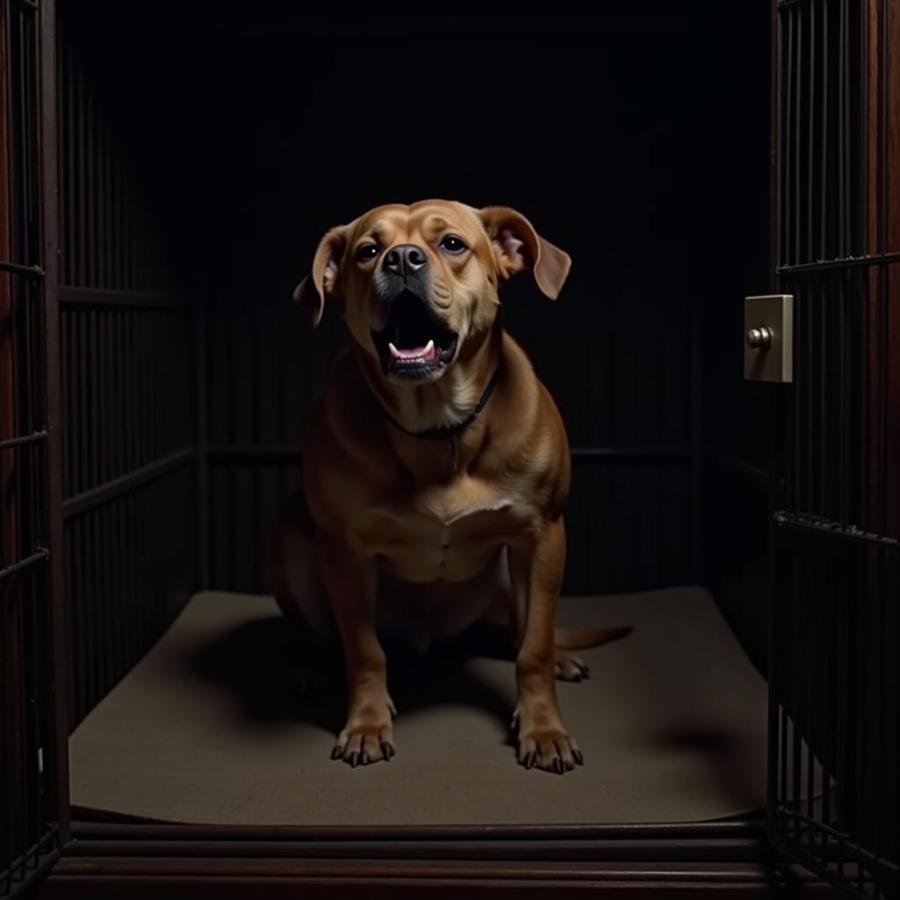Dealing with a dog barking during night can be incredibly frustrating for both you and your neighbors. Understanding why your furry friend is engaging in this nocturnal noise-making is the first step to finding a solution. From separation anxiety to territorial barking, this article explores the common causes of nighttime barking and provides practical, effective solutions to help everyone get a good night’s sleep.
Why Does My Dog Bark at Night?
Several reasons can contribute to your dog barking during night. Identifying the root cause is crucial for implementing the right solution. Is your dog barking at every little sound? They might be reacting to noises they hear outside, from rustling leaves to passing cars. This is territorial barking. On the other hand, perhaps your dog only barks when left alone at night. This could be a sign of separation anxiety. Other causes include boredom, lack of exercise, medical conditions, or simply needing to go potty.
Is It Territorial Barking?
Dogs are naturally protective of their territory. If your dog barks during night at noises outside, they likely perceive these sounds as threats. This is especially common in breeds known for their guarding instincts.
Could It Be Separation Anxiety?
If your dog is particularly attached to you, they might bark due to separation anxiety when left alone at night. This can manifest as whining, pacing, and destructive behavior in addition to barking.
 Lonely dog barking in a crate at night
Lonely dog barking in a crate at night
Solutions to Stop Nighttime Barking
Now that we’ve explored some of the reasons behind nighttime barking, let’s delve into some effective solutions. Remember, consistency is key when implementing these strategies.
Addressing Territorial Barking
- Block Visual Stimuli: Close curtains or blinds to prevent your dog from seeing potential “threats” outside.
- White Noise: Use a white noise machine or fan to mask outside noises.
- Desensitization and Counter-Conditioning: Gradually expose your dog to the triggering noises at a low volume while rewarding calm behavior.
Managing Separation Anxiety
- Create a Safe Space: Make your dog’s crate or bed a comfortable and inviting space with familiar toys and blankets.
- Gradual Departure Training: Practice leaving your dog alone for short periods, gradually increasing the duration.
- Medication: In severe cases, consult your veterinarian about medication options for anxiety.
General Tips to Curb Nighttime Barking
- Ensure Sufficient Exercise: A tired dog is less likely to bark excessively. Make sure your dog gets plenty of physical and mental stimulation during the day.
- Consistent Training: Basic obedience training can help you control your dog’s barking. Teach commands like “quiet” or “speak.”
- Ignore the Barking: Sometimes, the best approach is to ignore the barking. Avoid giving your dog attention when they bark, as this can reinforce the behavior.
- Rule Out Medical Issues: If the barking is sudden or unusual, consult your veterinarian to rule out any underlying medical conditions.
- Consider a Dog Trainer: For persistent barking issues, a professional dog trainer can provide personalized guidance.
Conclusion
Addressing dog barking during night requires patience, understanding, and a tailored approach. By identifying the underlying cause and implementing the right solutions, you can help your furry friend – and yourself – enjoy a peaceful night’s sleep. Remember, consistency is crucial for success. If you’re struggling to manage your dog’s barking, don’t hesitate to seek professional help from a veterinarian or certified dog trainer.
FAQ
- Why does my dog bark more at night? Nighttime barking can be triggered by various factors, including territorial instincts, separation anxiety, boredom, and outside noises.
- How do I stop my dog from barking at night? Solutions include blocking visual stimuli, using white noise, desensitization training, ensuring sufficient exercise, and consistent obedience training.
- What if my dog’s barking is due to separation anxiety? Creating a safe space, gradual departure training, and potentially medication can help manage separation anxiety.
- When should I consult a veterinarian about my dog’s barking? If the barking is sudden, excessive, or accompanied by other unusual behaviors, consult your veterinarian to rule out medical issues.
- Can a dog trainer help with nighttime barking? Yes, a professional dog trainer can assess your dog’s specific needs and develop a personalized training plan.
Further Questions?
For more information on dog behavior and training, check out our articles on lab dog barking and customize dog collars. You might also be interested in our guides on dog friendly hotel fort bragg ca and napa dog friendly hotels. Finally, for those interested in canine literature, we recommend checking out curious dog in the nighttime pdf.
Beaut Dogs is your one-stop resource for all things related to dog care. We provide expert advice, tips, and product recommendations to help you give your furry friend the best possible life. When you need personalized support, reach out to us via Email at [email protected] and Beaut Dogs will be happy to provide detailed and accurate answers. Visit https://beautdogs.com today to learn more!